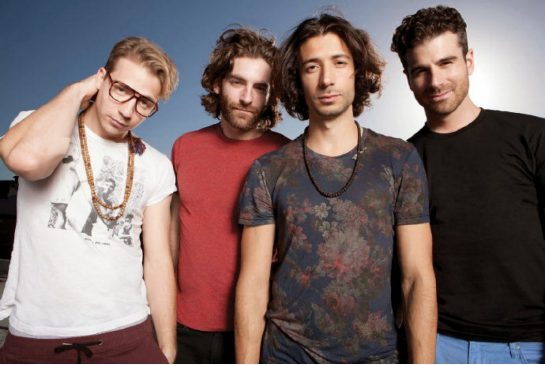From left, Alex Tanas, Ben Spivak, Nasri Atweh and Mark Pelli of the reggae-fusion band MAGIC!–
With Toronto-bred group up for Single of the Year at American Music Awards for Rude, homegrown reggae acts continue to struggle for mainstream success
“Growing up in Toronto, there’s a pretty heavy Caribbean descent (and) community there,” the band’s frontman, Nasri Atweh, told Spin magazine in a summer interview. “So you grow up going to different college parties and everyone’s always playing reggae in the clubs . . . for whatever reason ever since I was a kid, whenever I heard reggae or reggae groove or whatever it was, I just understood the fun but serious part of it. I kind of got it.”
But the success that made “Rude” a No. 1 hit in the U.S. has eluded other reggae acts in the Greater Toronto Area.
Take Brampton’s Tasha T. She has had top 10 songs in Canada, Ghana, Italy and the U.S., earned a Juno nomination and toured worldwide, but she has to work regular jobs to help sustain her 25-year music career.
Her most recent album, Real Talk, was released in May via her own label, RasVibe Records.
“A lot of times what I find with a lot of us here is that we have to have a 9-to-5 to really balance everything,” she said. “I do all types of different jobs. Administrative jobs, customer service, sometimes I work in the factory.
“Even with grants, there’s so many independent artists that try to apply for these grants and they’re not able to get it unless there’s a close link that you know inside that can help,” she added. “It’s like an up and down situation.”
Cultural critic Klive Walker has written about the history of Canadian reggae, including his 2005 book Dubwise. He says a big gap has existed since the 1970s, when artists such as Leroy Sibbles, Jackie Mittoo and Carlene Davis migrated here, and local acts such as Truths and Rights, Mojah, the Sattalites and Lillian Allen emerged.
The music industry never truly backed the reggae movement, he argues, lacking the financial backing of a visionary such as Island Records founder Chris Blackwell, who successfully marketed Bob Marley to an international fan base.
“The thing was kind of diseased from morning,” Walker said. “Lillian, Mojah and Truth and Rights had to do a lot of work on their own. It’s a tribute to them that they were able to chip off a piece of mainstream notoriety out of it, but at the same time they didn’t have a consistent and substantial mainstream presence because the industry around them didn’t understand what they were dealing with.”
He also says a lot of Jamaican-born artists who grew up here during the emergence of hip hop in the 1980s and ’90s chose hip hop instead of reggae given there were more opportunities to make money.
Perhaps the most successful mainstream Canadian reggae act was Messenjah, who originated in Kitchener in 1980. They were the first Canadian reggae band in 1985 to be signed by a major label, Warner Music Canada, and appeared in the Tom Cruise movieCocktail in 1988.
The group has been reconstituted and will appear at the Tattoo Rock Parlour on Nov. 14, releasing a new single and performing other songs from their upcoming album We Return.
Charles “Tower” Sinclair, the band’s bassist, argues that a lack of business sense has hindered progress within the Canadian reggae scene and thinks artists should hold themselves more accountable.
“What (labels) look for is a business,” he said. “You need a business head to talk to a business head. We cannot just blame other people, we have to blame ourselves too.”
Sinclair said reggae acts here should bear no grudge against MAGIC!, which mixes reggae with other styles, including R&B and jazz, in its music.
“We have a little jazz influence in reggae, a little country influence. So why can’t they have reggae in their funk or reggae in their calypso?” he said. “Why must we think reggae must belong to us. . . . We got it from somewhere too. We got it from ska, we got it from jazz. That’s how reggae came down to what we made it today.”
JuLion King, a Toronto reggae promoter and founder of Canadian Reggae World, notes that European and Asian countries, as well as the U.S., have become big markets for reggae over the years and questions why mainstream Canada has not adopted the music.
“I’ve done reggae jams in this country for the past 15 years,” he said. “We used to play at the Opera House, BamBoo and other places. There are people who do love the music here.
“Reggae is the only music that doesn’t get mainstream airplay, yet why is it in Poland? Why is it in Japan? It’s not a fluke that reggae can penetrate every country; how come we can’t sell it here in Toronto? We’re a nonentity.”
There is some hope for the future in the form of Manchester-born Toronto singer Exco Levi, who has won the last three Reggae Recording of the Year Junos.
He admits there could be more mainstream promotion of reggae in Canada but says the music has evolved in terms of production and public interest since he immigrated here in 2005.
“I remember the first time performing in Montreal, there were 15 people,” he said. “But at the beginning of this year, I performed in Montreal and it was a sold-out crowd; me alone and my band. When I looked around the crowd, it was mostly white people. The promoters said to me they’ve never seen a reggae artist from Toronto draw those crowds in Montreal before.”
With a new album set for release next March, Exco believes he can carry the banner for Canadian reggae music but says the industry here must do a better job of unearthing and developing reggae talents.
Things won’t change “until Canada and the reggae community here realize what they have and realize that they have to support their artists and play them on the mainstream (airwaves),” he said. “We need booking agents, we need an industry.”











